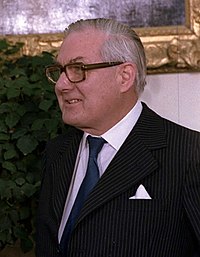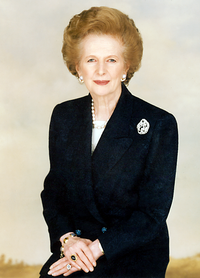1979 vote of no confidence in the Callaghan ministry

The 1979 vote of no confidence in the government of James Callaghan was a vote of no confidence in the British Labour Government of James Callaghan which occurred on 28 March 1979. The vote was brought by opposition leader Margaret Thatcher and was lost by the Labour Government by one vote (311 votes to 310), forcing a general election which was won by Thatcher's party. The last time an election had been forced by the House of Commons was in 1924, when Ramsay MacDonald, the first Labour Prime Minister, lost a vote of confidence.[1] Labour politician Roy Hattersley was later to remark that the vote marked "the last rites" of 'old Labour'.[2] Labour would not return to government for another 18 years. The BBC has referred to the vote as "one of the most dramatic nights in Westminster history".[3]
Background
Labour came to power in March 1974. The general election at the end of February resulted in a hung parliament where Labour had slightly more seats but no overall majority. The Conservatives had tried to negotiate a coalition with the Liberal Party, but these negotiations failed and Edward Heath's government resigned. Labour leader Harold Wilson then accepted the invitation to form a minority government. Wilson called a second election for October 1974, which gave Labour a wafer-thin majority of three. The Labour Government tackled inflation and unemployment at record post-war levels. Wilson resigned in 1976 on turning 60, and James Callaghan became Leader of the Labour Party and Prime Minister. By-elections and defections whittled away Labour's majority. By April 1976 Labour had lost its majority in the House of Commons after a by-election defeat, the defection of two Labour MPs to form the Scottish Labour Party and the defection of backbencher John Stonehouse.[4]
In 1977 the Labour Government and the Liberal Party contracted the Lib-Lab pact by which the Liberals agreed to support the Government in return for pre-legislative consultation. The pact lasted for a year before lapsing in July 1978;[4] thereafter the Liberal Party declared that they supported a general election as soon as possible and would therefore support any no confidence motions. Callaghan was widely expected to call an election in September 1978 but decided against, hoping that the Labour Party would fare better in a year's time once the economy had improved. However the winter saw a prolonged period of industrial unrest known as the Winter of Discontent which severely reduced Labour's popularity.[4] The government survived a motion of no confidence in December 1978 by ten votes after obtaining the support of the Ulster Unionists (legislation had been introduced to give Northern Ireland more Parliamentary seats; it cleared the House of Commons on 17 January 1979).
On 1 March 1979 the referendum on the Scotland Act resulted in a majority of those voting supporting implementing the Act, but a threshold imposed by anti-devolution MPs requiring 40% of the electorate to support was not reached.[4] When the Government refused to implement the Act anyway, the Scottish National Party group put down a motion of no confidence. After consulting with the Liberal Party to confirm that they were still supporting motions of no confidence, Leader of the Opposition Margaret Thatcher put down her own motion which took precedence. The debate was scheduled for Wednesday, 28 March 1979.[4]
Motion and debate
The motion moved by Margaret Thatcher MP was "That this House has no confidence in Her Majesty's Government".[5]
During the debate Callaghan criticised the Scottish National Party, committed to independence for Scotland, for voting with the Conservative Party who opposed devolution. The Scottish National Party were to lose all but two of their seats in the election following the no confidence vote:
"We can truly say that once the Leader of the Opposition discovered what the Liberals and the SNP would do, she found the courage of their convictions. So, tonight, the Conservative Party, which wants the Act repealed and opposes even devolution, will march through the Lobby with the SNP, which wants independence for Scotland, and with the Liberals, who want to keep the Act. What a massive display of unsullied principle! The minority parties have walked into a trap. If they win, there will be a general election. I am told that the current joke going around the House is that it is the first time in recorded history that turkeys have been known to vote for an early Christmas."
– James Callaghan during the No confidence debate[6]
Vote

The government lost by one vote.[7] Margaret Thatcher initially believed she had lost the vote after a rough calculation as to the vote's outcome had been made without counting the two Conservative tellers who had counted the votes. Due to the closeness of the vote there is some debate as to whether deals could have been made which would have kept the Government in power. Had the vote been tied, the Speaker would have cast the deciding vote which would have likely been cast in favour of the Government, as the Speaker of the House of Commons was both a Labour member prior to becoming Speaker and by convention the Speaker votes with the status quo in the event of a tied vote.[8] After the vote Conservative backbenchers cheered and Labour left-wingers sang the Red Flag.[1]
| Yes votes | 311 |
|---|---|
| No votes | 310 |
Enoch Powell and Ulster Unionists
Before the vote there were some discussions between Labour, the Ulster Unionists and Enoch Powell regarding to deal over a Northern Irish pipeline which would provide cheap energy to Northern Ireland. Callaghan was unwilling to support the proposal due to unhappiness with minority government. There were also discussions about a separate inflation index for Northern Ireland.[9]
Sir Alfred Broughton
One crucial vote was lost by Labour backbencher Sir Alfred Broughton who was unable to attend the vote due to ill health.[1] Broughton was mortally ill and died a few days after the vote but was determined to come to Westminster if it meant saving the Government, although his doctor was strongly opposed. Parliamentary procedure would have allowed his vote to be counted even if he remained within an ambulance at Speaker's Court. However, after a debate over what would happen if Broughton died en route, Callaghan finally decided that he would not risk Broughton's health by asking him to travel, a decision which was to bring down the Government.[2] Broughton died on 2 April 1979. According to some sources[who?] Callaghan changed his mind on the evening of the debate, but too late for Broughton to be brought down from Yorkshire.
Welsh Nationalists
Plaid Cymru supported the Labour Government after extracting concessions from them.[9]
Irish Nationalists
Without Broughton Labour needed the support of Irish MPs to tie the vote. Gerry Fitt, leader of the Social Democratic and Labour Party, was sympathetic to the Labour Party and Frank Maguire, an Independent Republican, had supported the government on previous knife-edge votes but were unhappy with proposals which would increase the number of constituencies in Northern Ireland and therefore increase Unionist representation. Fitt eventually decided to not support Labour but that he would campaign for them to be re-elected if they lost.[9] He urged Frank Maguire to do the same. Although not an abstentionist Member of Parliament, Maguire rarely attended the House of Commons; he made the long trip to Westminster to attend the no confidence vote, only to abstain from the vote in person.[10] The BBC documentary "A Very British Coup" states that Frank Maguire's wife was (unknown to Fitt) sitting in the public gallery of the House of Commons and urged her husband not to vote after hearing Fitt.[10]
Aftermath

The vote of no confidence prompted Callaghan to call a general election, stating, "We shall take our case to the country." His other option was to resign and accept Mrs Thatcher would be appointed PM. The resulting general election was won by the Conservative Party and led to 18 years of Conservative rule. After losing the election Callaghan remained Labour leader for another year before being succeeded by Michael Foot.[11]
See also
References
- ^ a b c "BBC ON THIS DAY | 28 | 1979: Early election as Callaghan defeated". BBC News. 28 March 1979. Archived from the original on 27 June 2009. Retrieved 2 June 2009.
{{cite news}}: Unknown parameter|deadurl=ignored (|url-status=suggested) (help) - ^ a b "Roy Hattersley on the fall of James Callaghan's government | Politics | The Observer". The Guardian. London. 22 March 2009. Retrieved 2 June 2009.
- ^ "The Night the Government Fell". BBC News. 26 March 2009. Retrieved 20 April 2010.
- ^ a b c d e http://www.bbc.co.uk/politics97/background/pastelec/ge79.shtml
- ^ Hansard, House of Commons, 5th series, vol. 965, col. 589
- ^ Hansard, House of Commons, 5th series, vol. 965, col. 471
- ^ "James Callaghan". Number10.gov.uk. Archived from the original on 3 June 2009. Retrieved 2 June 2009.
{{cite web}}: Unknown parameter|deadurl=ignored (|url-status=suggested) (help) - ^ http://news.google.com/newspapers?nid=932&dat=19790329&id=tbQOAAAAIBAJ&sjid=xIIDAAAAIBAJ&pg=7143,7635681
- ^ a b c "News – Wales News – It could be worse, Gordon. Think of Callaghan in '79". WalesOnline. Retrieved 2 June 2009.
- ^ a b "The Night the Government Fell". BBC News. 31 March 2009. Retrieved 20 April 2010.
- ^ "Politics | Obituary: Lord Callaghan". BBC News. 26 March 2005. Retrieved 2 June 2009.
External links
- Hansard text of debate
- Roy Hattersley's account of the vote of no confidence
- Archive material from the BBC
Template:Motion of no confidence votes in in the United Kingdom

